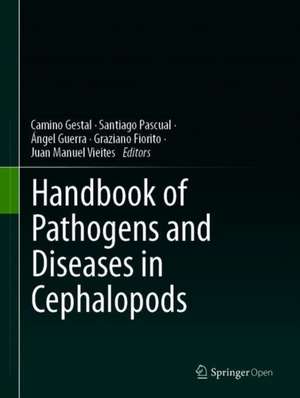Handbook of Pathogens and Diseases in Cephalopods
Editat de Camino Gestal, Santiago Pascual, Ángel Guerra, Graziano Fiorito, Juan M. Vieitesen Limba Engleză Hardback – 21 mar 2019
Preț: 440.22 lei
Nou
Puncte Express: 660
Preț estimativ în valută:
84.25€ • 87.63$ • 69.55£
84.25€ • 87.63$ • 69.55£
Carte disponibilă
Livrare economică 24 martie-07 aprilie
Preluare comenzi: 021 569.72.76
Specificații
ISBN-13: 9783030113292
ISBN-10: 3030113299
Pagini: 205
Ilustrații: XV, 230 p. 173 illus., 150 illus. in color.
Dimensiuni: 210 x 279 mm
Greutate: 0.86 kg
Ediția:1st ed. 2019
Editura: Springer International Publishing
Colecția Springer
Locul publicării:Cham, Switzerland
ISBN-10: 3030113299
Pagini: 205
Ilustrații: XV, 230 p. 173 illus., 150 illus. in color.
Dimensiuni: 210 x 279 mm
Greutate: 0.86 kg
Ediția:1st ed. 2019
Editura: Springer International Publishing
Colecția Springer
Locul publicării:Cham, Switzerland
Cuprins
1. Introduction.- 2. Importance of Cephalopod health and welfare for the commercial sector.- Part I: Functional anatomy and histology.- 3 Functional anatomy: Macroscopic anatomy and post-mortem examination.- 4. Functional histology: The tissues of the common coleoid cephalopods.- 5. Tissues of paralarvae and juvenile cephalopods.- Part II: Pathogens and related diseases.- 6. Cephalopod diseases caused by fungi and Labyrinthulomycetes.- 7. Virus and virus-like particles affecting cephalopods.- 8. Bacteria affecting cephalopods.- 9. Protist (Coccidian) and related diseases.- 10 Protist (Ciliates) and related diseases.- 11. Dicyemids.- 12 Metazoa and related diseases.- 13 Aquarium maintenance related diseases.- 14 Regeneration and healing.- 15 Other disorders.- 16 Cephalopod Senescence and Parasitology.- 17 Pathogens and related diseases in other non-European cephalopods: Central and South America.- 18 Pathogens and related diseases in other non-European cephalopods:Asia. A Preliminary review.
Notă biografică
Camino Gestal, Aquatic Molecular Pathobiology Group, Institute of Marine Research (IIM-CSIC), Vigo, Spain
Textul de pe ultima copertă
The aim of this open access book is to facilitate the identification and description of the different organs as well as pathogens and diseases affecting the most representative species of cephalopods focussed on Sepia officinalis, Loligo vulgaris and Octopus vulgaris. These species are valuable ‘morphotype’ models and belong to the taxonomic groups Sepioidea, Myopsida and Octopoda, which include most of the species with a high market value and aquaculture potential. The study is based on photographs at macroscopic and histological level in order to illustrate the role of the most important pathogens and related diseases from the view of a pathological diagnosis. The reader is able to familiarize with functional anatomy, necropsy and general histology of adults and paralarvae, as well as with the identification of different pathogens and pathologies. This work is thus an invaluable guide for the diagnosis of cephalopod diseases. Besides including pathogens for non-European cephalopod species, it also provides a useful contribution encouraging marine pathologists, parasitologists, veterinarians and those involved in fishery sanitary assessments, aquarium maintenance and aquaculture practices aiming to increase their knowledge about the pathology of cephalopods.
Caracteristici
Includes a comprehensive overview of the pathologies observed in wild and aquarium-maintained cephalopods Presents fundamental aspects of the anatomical and histological structures of cephalopods Features the identification of different pathogens, histopathologies and diagnosis of diseases in cephalopods Useful for marine pathologists, parasitologists, veterinarians and those involved in fishery sanitary assessment, aquarium maintenance and aquaculture practice
